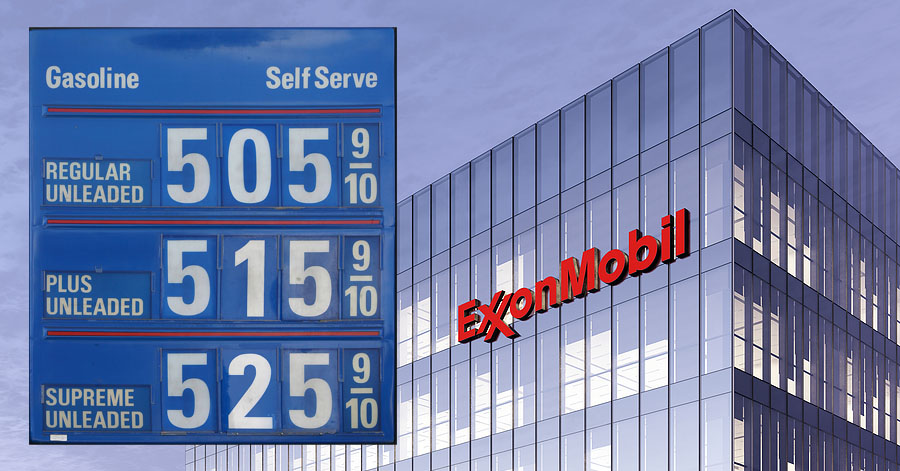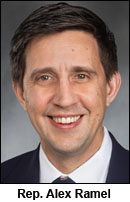OPINION
Big Oil, not state’s climate efforts, is gouging your wallet
By REP. ALEX RAMEL
(July 12, 2023) — Over the last few weeks, the public has been increasingly besieged by a public relations campaign focusing our attention on gas prices in Washington. I’ve seen billboards, videos, print ads and an opinion piece in Cascadia Daily News. “Affordable Fuel Washington” — an astroturf organization with ties to the Western State Petroleum Association — has teamed up with conservative lawmakers to frame our state’s efforts to turn the tide on climate change as the culprit for gas prices.
You, your family and your wallet should be aware of what’s truly at stake here — corporations that stand to profit would prefer to blame Olympia when gas prices go up. Their argument is simply that gas prices are high this year, and cap and trade started this year. But correlation isn’t causation; you should know the whole story.
The Climate Commitment Act, which passed in 2021 and took effect this year, caps Washington’s overall greenhouse gas emissions and imposes a compliance obligation on large polluters. For transportation fuels like gasoline and diesel, this responsibility falls on the company supplying the fuel.

Fuel suppliers in Washington have largely chosen to pass these costs along to their consumers, instead of accepting slightly lower profit margins. The Seattle metro area is the second-most profitable market for fuel suppliers in the U.S., with an average profit margin of $1.09 per gallon in December 2022. These same oil companies recorded their biggest profits in history during the first quarter of this year while they were adding a surcharge that they passed on to drivers in January — a month and a half before the first cap and trade auction.
Rather than incorporating the regulatory costs of reducing their pollution into their bottom line, oil corporations made a conscious decision to pass that cost on to you and then funded a PR campaign to shift the blame. It’s time to look at the oil industry profits and pricing structure to consider whether these corporate practices are legal, appropriate and fair.
AAA has reported that fuel prices are also correlated to pre-scheduled maintenance on the BP Olympic Pipeline that connects four of Washington’s refineries. We hope and expect that fuel prices will fall once the maintenance is complete and the summer gas price spike subsides. We can also expect to see compliance costs under the Climate Commitment Act decrease once the program has been up and running for longer and as companies find cost-effective ways to cut pollution.
Any remaining cost ought to be alleviated by reducing oil company profits rather than increasing the burden on consumers. If oil companies won’t take that step on their own, we should work to address it with windfall profits taxes or anti-price gouging legislation.
These polluters want us to repeal the cap-and-trade program, but that won’t help our communities in the long term. What’s truly at stake is hundreds of billions of dollars in damage from natural disasters, reduced crop yields, rampant wildfires, an overstressed health care system due to heat fatigue and illness, and much more. These impacts fall hardest on vulnerable people in our communities with the least resources. Acting now to switch to clean, efficient energy can help prevent these long-term costs.
The Climate Commitment Act is already utilizing revenue raised from its first two auctions to help our communities have access to affordable active transportation, alternative fuel and electrification that creates good-paying jobs, and modernizing our railways, ports and ferry systems. Washington is directing investments to decarbonize electricity, increase building energy efficiency, make Washington a leader in clean hydrogen, protect forests and provide funding for local emissions reduction projects.
Much of this investment is focused on reducing and eliminating inequalities that for too long have made low-income communities last in line for solutions while they are first to be impacted by pollution. This funding will tangibly change Washington for the better. Confronting the climate crisis isn’t going to be all easy. But like most problems, it gets worse and more expensive the longer we ignore it. Last week, our planet saw the three hottest days in modern history. Climate change is upon us and we can’t afford to delay.
If oil companies or their surrogates suggest repealing the Climate Commitment Act, we should ask what they propose to replace it. Until I hear a better idea, I’m convinced that polluters’ pay is a fair system and an efficient way to support the emerging clean economy, a healthy, clean energy workforce, and real climate justice.
 Rep. Alex Ramel (D-Bellingham) represents Washington’s 40th Legislative District, which includes south Bellingham, the northern Skagit Valley and the San Juan Islands. This column, which originally appeared in the Cascadia Daily News, is posted here with the author’s permission.
Rep. Alex Ramel (D-Bellingham) represents Washington’s 40th Legislative District, which includes south Bellingham, the northern Skagit Valley and the San Juan Islands. This column, which originally appeared in the Cascadia Daily News, is posted here with the author’s permission.





